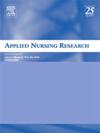Effects of e-health literacy on health-related quality of life in young adults with type 2 diabetes: Parallel mediation of diabetes self-efficacy and self-care behaviors
IF 2.2
4区 医学
Q1 NURSING
引用次数: 0
Abstract
Aim
To explore the impact of e-health literacy (e-HL) on health-related quality of life (HRQOL) in young adults with type 2 diabetes (T2D), focusing on the mediating roles of diabetes self-efficacy and self-care behaviors.
Background
If glucose levels are not kept within the target range, people with T2D may experience complications such as retinopathy, kidney disease, and cardiovascular disorders.
Methods
The participants were 150 young adults, aged 18 to 39, with T2D. We assessed e-HL, diabetes self-care behaviors, diabetes self-efficacy, and HRQOL through a structured online survey. Data were analyzed using IBM SPSS Statistics, incorporating Pearson's correlation and PROCESS macro mediation analysis.
Results
E-HL, diabetes self-efficacy, and diabetes self-care behavior together accounted for 40.6 % of the variance in HRQOL. Higher e-HL was significantly correlated with improved HRQOL. A significant mediating effect of diabetes self-efficacy in the relationship between e-HL and HRQOL was observed, with an effect size of 0.300 ([95 % confidence interval = 0.055, 0.577]). However, the mediating effect of diabetes self-care behavior in the relationship between e-HL and HRQOL through diabetes self-efficacy was small and not statistically significant.
Conclusions
This study underscores the critical role of e-HL in enhancing HRQOL among young adults with T2D. It highlights the need for targeted digital health education, especially in subgroups with lower educational levels or poor health habits. The findings advocate for tailored interventions to boost self-efficacy and self-care behaviors, thereby improving overall quality of life in this population.
电子健康素养对年轻2型糖尿病患者健康相关生活质量的影响:糖尿病自我效能感和自我保健行为的平行中介作用
目的探讨电子健康素养(e-HL)对年轻2型糖尿病(T2D)患者健康相关生活质量(HRQOL)的影响,重点关注糖尿病自我效能感和自我保健行为的中介作用。如果血糖水平不能保持在目标范围内,t2dm患者可能会出现视网膜病变、肾脏疾病和心血管疾病等并发症。方法研究对象为年龄在18 ~ 39岁的T2D青年150人。我们通过结构化的在线调查评估e-HL、糖尿病自我护理行为、糖尿病自我效能和HRQOL。数据分析采用IBM SPSS Statistics,结合Pearson’s correlation和PROCESS宏观中介分析。结果:hl、糖尿病自我效能感和糖尿病自我护理行为共同占HRQOL方差的40.6%。较高的e-HL与改善的HRQOL显著相关。糖尿病自我效能感在e-HL与HRQOL的关系中具有显著的中介作用,效应量为0.300(95%可信区间= 0.055,0.577)。而糖尿病自我护理行为通过糖尿病自我效能感在e-HL与HRQOL之间的中介作用较小,无统计学意义。结论本研究强调了e-HL在提高年轻t2dm患者HRQOL中的关键作用。它强调需要有针对性的数字健康教育,特别是在教育水平较低或卫生习惯不良的亚群体中。研究结果提倡量身定制的干预措施,以提高自我效能和自我护理行为,从而提高这一人群的整体生活质量。
本文章由计算机程序翻译,如有差异,请以英文原文为准。
求助全文
约1分钟内获得全文
求助全文
来源期刊

Applied Nursing Research
医学-护理
CiteScore
4.50
自引率
0.00%
发文量
65
审稿时长
70 days
期刊介绍:
Applied Nursing Research presents original, peer-reviewed research findings clearly and directly for clinical applications in all nursing specialties. Regular features include "Ask the Experts," research briefs, clinical methods, book reviews, news and announcements, and an editorial section. Applied Nursing Research covers such areas as pain management, patient education, discharge planning, nursing diagnosis, job stress in nursing, nursing influence on length of hospital stay, and nurse/physician collaboration.
 求助内容:
求助内容: 应助结果提醒方式:
应助结果提醒方式:


